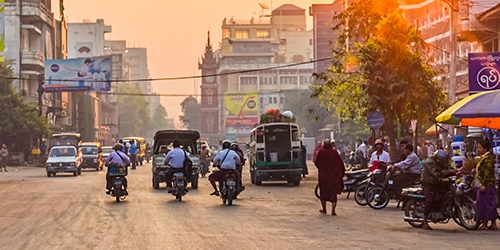Milestones | Myanmar

After five decades of economic isolation, on October 1, Myanmar took its first big step into the global financial system, granting nine foreign lenders preliminary approval to operate in the country. The candidates will have a year to meet the criteria set by the Central Bank of Myanmar in order to receive full licenses. Among the candidates are Singapore’s Oversea-Chinese Banking Corporation and United Overseas Bank, Malaysia’s Maybank, Industrial and Commercial Bank of China, Thailand’s Bangkok Bank, Australia’s ANZ Group and Japan’s three megabanks (Bank of Tokyo-Mitsubishi UFJ, Sumitomo Mitsui Banking Corporation and Mizuho).
The licenses are an historic advancement toward the liberalization of Myanmar’s obsolete financial sector. The winning bidders will gain a strong foothold in what is considered one of Asia’s fastest-developing nations. The opportunity, however, comes with strict limits. The lenders will be allowed to operate just one branch each, and they are prohibited from engaging in retail banking. They can lend only to foreign investors in foreign currencies, unless they partner with a local bank.
“It is a positive development, but also something of a missed opportunity,” remarked Sean Turnell, co-editor of Burma Economic Watch and an associate professor in Economics at Macquarie University in Sydney. “Myanmar’s financial system is extraordinarily small and fails to fulfill the role of mobilizing the country’s savings and allocating these to productive investment. No more than 10% of the population have bank accounts, and most businesses cannot access bank credit: The restrictions and conditions attached render many of the possible contributions of foreign banks void, with scarcely any contact with Burmese customers.”
However, according to Warren Bailey, professor of finance at the Samuel Curtis Johnson Graduate School of Management at Cornell University in New York, this is probably just a first step. “The usual comparison for banking liberalization would be China. One can imagine the nine banks believe they can eventually extend their services to local firms and individuals. Moreover, many actors in China mask their nationality with ‘foreign’ businesses organized in places like Bermuda, the Cayman Islands and the British Virgin Islands.”



